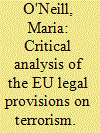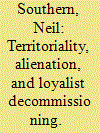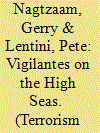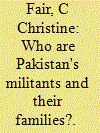|
|
|
Sort Order |
|
|
|
Items / Page
|
|
|
|
|
|
|
| Srl | Item |
| 1 |
ID:
080880


|
|
|
|
|
| Publication |
2008.
|
| Summary/Abstract |
Existing analyses of non-state armed-group combat motivations are inadequate because they essentialize combat motivation, fail to recognize the polymorphous character of non-state warfare, and confound agency and structure by equating individual combatant motivation with the context of the conflict. In order to account for the more dynamic nature of combat motivation in armed groups versus conventional militaries, this article offers a two-dimensional framework for understanding combatant motivation. The first dimension is based on context-specifically, terrorist, insurgent and warlord forms of warfare-and the second on individual motivation-including communitarian, economic, and existential motivations. The article then illustrates the interplay between these two dimensions.
|
|
|
|
|
|
|
|
|
|
|
|
|
|
|
|
| 2 |
ID:
080877


|
|
|
|
|
| Publication |
2008.
|
| Summary/Abstract |
Terrorism activities within the EU are essentially transnational. Given that counter-terrorism operations and prosecutions have been allocated to different actors in different EU member states, operating within quite differing legal provisions and systems, co-ordination by the EU in this area is to be welcomed. In addition to critically examining the new EU laws in this area, this paper focuses on legal framework for the interaction of police, security services, and judiciary across Europe in this task, to include Europol and Schengen provisions. It also pays particular attention to the divergent positions of the UK and Ireland within this framework.
|
|
|
|
|
|
|
|
|
|
|
|
|
|
|
|
| 3 |
ID:
080876


|
|
|
|
|
| Publication |
2008.
|
| Summary/Abstract |
This study finds that the issue of preventing terrorist attacks has received surprisingly little attention by decision-makers and the news media, and only sporadic interest by pollsters. When it comes to homeland security, how to protect the nation and its people from actual attacks takes a back seat to press coverage of threats and other aspects of terrorism, particularly the administration's arguments for fighting the "war on terrorism" abroad as a means to prevent further terrorism at home. This inattention to the difficult task of preventing further catastrophic terror attacks by taking measures at home may affect the nation's vigilance as time has passed since 9/11.
|
|
|
|
|
|
|
|
|
|
|
|
|
|
|
|
| 4 |
ID:
080879


|
|
|
|
|
| Publication |
2008.
|
| Summary/Abstract |
During the Northern Ireland Troubles some Protestant communities suffered more than others. The loyalist Shankill area of West Belfast is one such place. Geographically situated between the republican strongholds of the Ardoyne and Falls, it was regularly exposed to violent attack. The area witnessed a series of republican bombings that included children in the death toll as well as many deadly shootings. Violence of this kind has left an indelible mark on the Shankill community. However, more than other loyalist areas, it was prepared to respond to republican violence with violence. But the community has not emerged from the Troubles with confidence. Unanticipated post-conflict factors of a political, cultural, and territorial nature are undermining efforts to promote community confidence and encourage paramilitary groups to decommission their weapons.
|
|
|
|
|
|
|
|
|
|
|
|
|
|
|
|
| 5 |
ID:
080881


|
|
|
|
|
| Publication |
2008.
|
| Summary/Abstract |
Defining terrorism and explaining how it occurs remains a contentious issue. This article attempts to generate new understandings on these topics by applying the work of Ehud Sprinzak's delegitimatization model to the Sea Shepherds. Evidence presented in the article suggests that the Sea Shepherd's present level of political violence passed through gradual phases. In this respect, it is possible to suggest that Sprinzak's model has applicability for maritime organizations, as well as terrestrial based groups. However, we also note that on the one hand, it may be possible to argue that in some respects the Sea Shepherds may constitute either a "blind spot" in the literature on terrorism and political violence, because its actions could in some circumstances be considered activism, militant direct action, piracy, vigilantism, terrorism, or eco-defense, which makes it very difficult to classify. On the other hand, that both the Sea Shepherds and the whalers may both engage in illegal activities, but are not prosecuted, may indicate that states and the international community may have neither the will nor the means to enforce laws against them. Therefore, they may be turning a blind eye to their actions. Throughout the article we maintain that the Sea Shepherds constitute an example of a gray area phenomenon. Despite the ambiguity surrounding their legal status and academic interpretations of their actions, the results of nearly three decades of the organization's activities, including its 2007 campaign to disrupt Japanese Antarctic Whaling, suggest that the Sea Shepherds may be best categorized as a vigilante group, because they claim they are seeking to enforce a legal status quo because of states' and the international community's inabilities or unwillingness to do so.
|
|
|
|
|
|
|
|
|
|
|
|
|
|
|
|
| 6 |
ID:
080878


|
|
|
|
|
| Publication |
2008.
|
| Summary/Abstract |
This article presents results of a survey of 141 Pakistani families of slain militants. This survey collected data about the militants and their households. While derived from a convenience sample, these data are unprecedented and offer a glimpse into the backgrounds of militants and the families who (mostly) supported their decision to join the jihad. Most militants served and died in Kashmir and seem to be "high quality" militants in that they, like their heads of household, are well educated and not predominantly coming from seminaries, as is often claimed. This analysis suggests that while the militants merit attention, so do the families that produce militants.
|
|
|
|
|
|
|
|
|
|
|
|
|
|
|
|
|
|
|
|
|